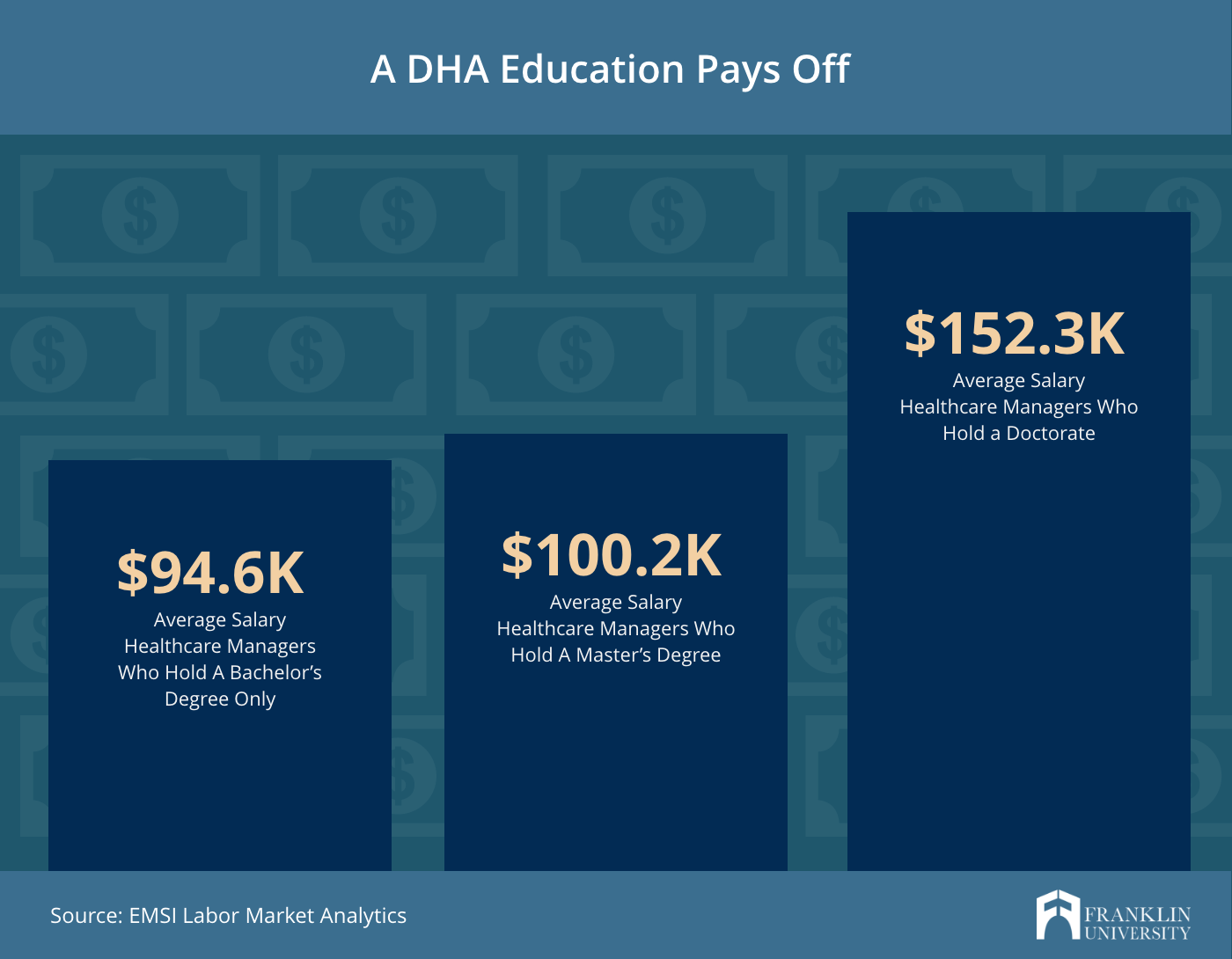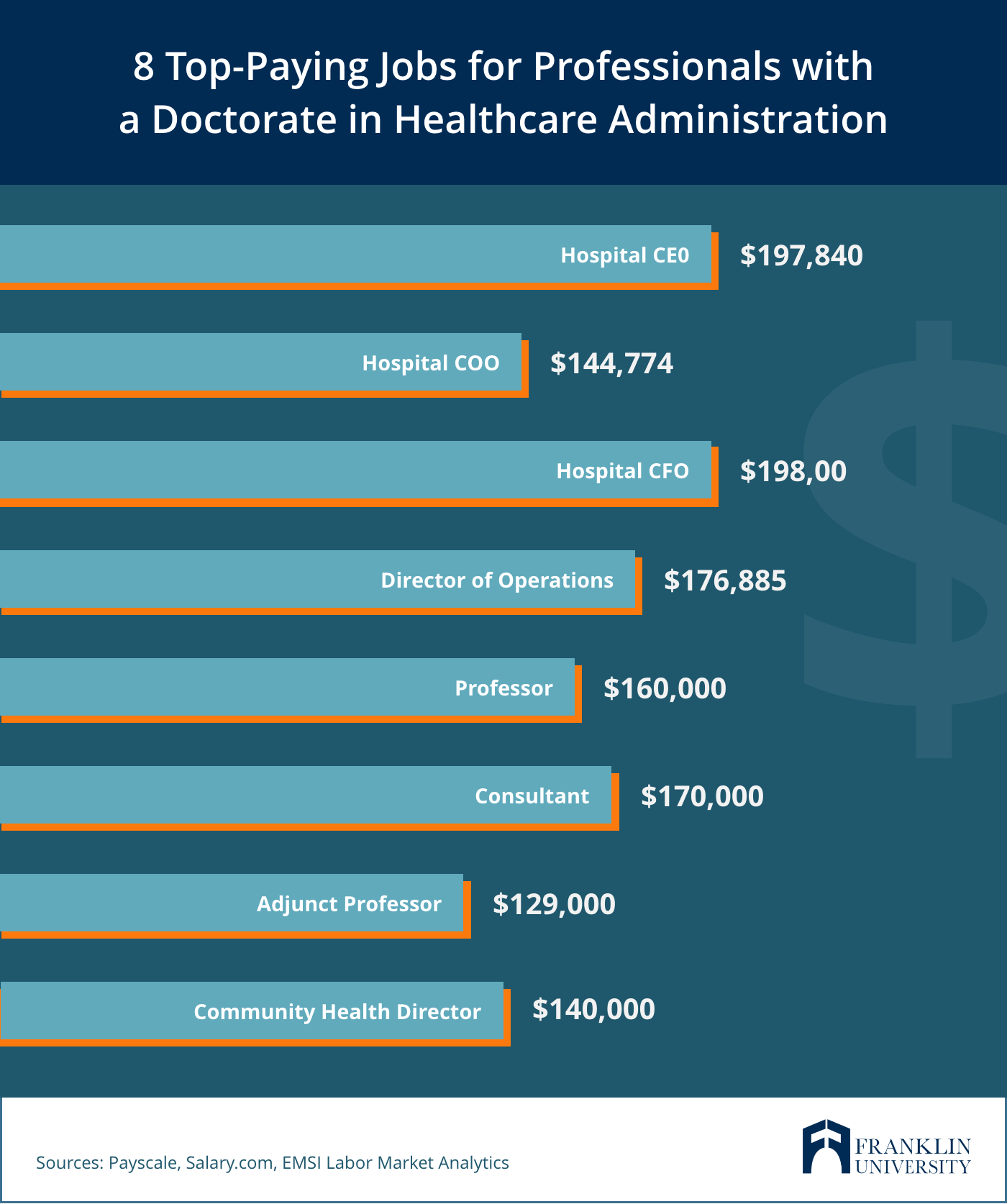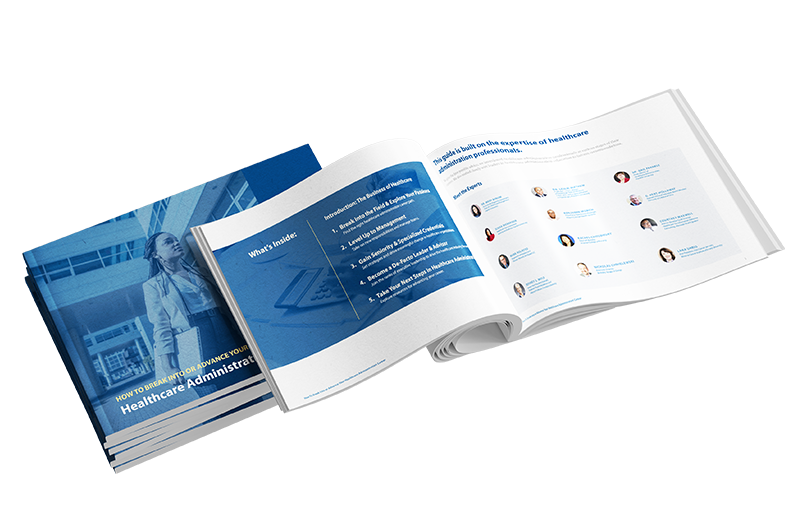Request Information
We're Sorry
There was an unexpected error with the form (your web browser was unable to retrieve some required data from our servers). This kind of error may occur if you have temporarily lost your internet connection. If you're able to verify that your internet connection is stable and the error persists, the Franklin University Help Desk is available to assist you at helpdesk@franklin.edu, 614.947.6682 (local), or 1.866.435.7006 (toll free).
Just a moment while we process your submission.

Doctorate in Healthcare Administration Salary: 8 Top-Paying Jobs
The U.S. healthcare system is large and complex, made even more complicated by pandemic-related challenges and aging Baby Boomers. From patient safety to risk management and service quality, there is ample room for innovation and improvement, and the people prepared to lead the charge have terminal degrees in healthcare, particularly doctorates in healthcare administration (DHA).
Without question, the nation’s healthcare systems need fresh yet practical solutions to help solve real-world healthcare dilemmas, gaps and problems. This presents an opportunity for leaders with a DHA to amplify their careers, both in responsibility and lifetime earning potential.
The Current Demand for Professionals with a DHA
Job outlooks in healthcare administration are on the rise, with the BLS projecting the industry to increase 18% from 2016-2026. The growth is due to a variety of factors, including the COVID pandemic.
“COVID shook up leadership in healthcare,” said Dr. Gail Frankle, DHA program chair at Franklin University. “The old-style leaders retired while people who were able to pivot were innovative and called on their teams to step up to the plate and weather the storm. Now those innovative leaders can see their own potential and are earning doctorate degrees.”
And that’s a good thing, considering healthcare administration is on the rise and earning a terminal degree prepares leaders to make logical, relevant connections between classroom learning and real-world efficiencies and effectiveness.
Advance your career in Healthcare Administration while you advance patient care. Download your free career guide.
Income Potential for Professionals with a DHA
Financial compensation for healthcare professionals with a DHA can be impacted by a number of factors, including education, experience and geography. According to data from labor analytics firm EMSI, the advertised annual salary for healthcare manager positions in the U.S. requiring a bachelor's degree was about $94,000. Postings requiring a master's degree advertised an annual salary of about $100,000 while postings requiring a doctorate offered about $152,000.

But while earning a DHA can present lucrative opportunities, the program isn’t a fit for everyone.
“You’re not a good fit for a doctor of healthcare administration program if you’ve never worked in healthcare. You need to come with some background,” said Frankle. “Earning a DHA is not a way to break into the industry. When I talk to a student, I want to know what they want to do for a career and what they’re willing to sacrifice. The program is not for everybody.”
The Best-Paying Jobs for DHAs
What are the best-paying jobs for a professional with a DHA to pursue? Fortunately, there are many. Let’s look at some of the top potential professions for DHA graduates and how much they may be able to make on a yearly basis.

Hospital CEO | Average Salary (Bureau of Labor and Statistics): $197,840
Hospital CEOs are responsible for everything that goes on within a hospital and are very management-oriented. CEOs meet frequently with other hospital executives and boards of directors to ensure things go as planned and on budget.
Hospital CFO | Average Salary (Payscale): $198,000
Hospital CFOs carry the primary responsibility for the quality of their institutions' financial reports, ensuring accuracy in financial statements and working with budgets to oversee how money is being spent.
Hospital COO | Average Salary (Payscale): $144,774
As a liaison among executive personnel members of each hospital department, Hospital COOs ensure that one department's activities do not interfere with another and confirm adherence to stated missions and guidelines.
Director of Operations | Average Salary (Salary.com): $176,885
A director of operations plans, directs, coordinates, and manages people and policies of a medical operation, which may include formulating policies, monitoring budgets, overseeing programs and assessing patient satisfaction.
Professor | Top 10% of Earners (EMSI): $160,000
Professors share research-supported information with students in a variety of academic, medical or business settings with the goal to inform or instruct people in the healthcare field.
Consultant | Average Salary Plus Commission (Payscale): $170,000
Consultant positions can vary greatly, but they typically act as an analyst, learning about a healthcare-related organization’s operations to improve efficiencies by identifying problem areas and proposing solutions.
Adjunct Faculty | Top Earners (Payscale): $129,000
Public health is a rapidly growing field and colleges are seeking DHAs to become tenured professors of public health, healthcare administration and public policy.
Community Health Director | Average Salary (Salary.com): $140,000
A community health director may not make as much as other professions in the field; however, the role presents opportunities to make a difference and serve a community, providing a clear track to build a career in Washington, D.C., or as a manager of a federal team.
Expand Your Opportunities in Healthcare with a DHA
While a professional’s salary is always determined by a combination of factors, earning a DHA can give job candidates increased earning potential across their lifetime and access to a wider range of positions. A great place to start is Franklin University because the program is very student-focused, providing exemplary support so students achieve their goals.
“The student is always our focus at Franklin. Everyone who comes into this program is given a variety of advisors who stay with them throughout their coursework and our instructors are phenomenal,” said Frankle. “We want our students to graduate and have successful careers.”
Franklin University’s program is 100% online and features a relevant curriculum plus a variety of electives that allows students to customize their program. Some students even complete their degree in three years, including dissertation.





